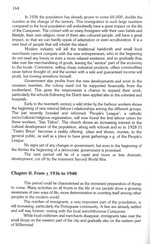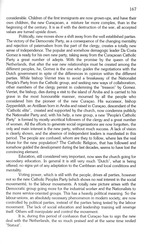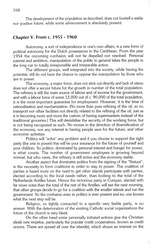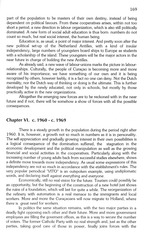| 1 |
 |
“...164
In 1936 the population has already grown to some 60,000, double the number at the change of the century. This immigration in such large numbers compared to the local population will undoubtedly have a great impact on the life of the Curaaoan. The contact with so many foreigners with their own habits and lifestyle, their own religion, most of them also coloured people, will have a great impact, so that we can hardly speak of adaptation or even acculturation. It is a new kind of people that will inhabit the island.
Modern industry will kill the traditional handcraft and small local merchants cannot compete with the new entrepreneurs, who in the beginning do not need any luxury or even a more relaxed existence, and so gradually they take over the merchandising of goods, leaving the "service" part of the economy to the locals. Commerce, selling cheap industrial products, offers commodities never before thought of, and the worker with a safe and guaranteed income will profit, but loosing...”
|
|
| 2 |
 |
“...century. It is as if with the destruction of the war, all accepted values are turned upside down.
Politically, new moves show a shift away from the well established parties. The victory of the Democratic Party, as a consequence of the changing mentality and rejection of paternalism from the part of the clergy, creates a totally new sense of independence. The popular and somehow demagogic leader Da Costa Gomez is ready for his own new party, taking away from the Curaaoan Catholic Party a great number of adepts. With the promise by the queen of the Netherlands, that after the war new relationships must be created among the different peoples, he, Gomez is the one who guides the negotiations with the Dutch government in spite of the differences in opinion within the different parties. While bishop Verriet tries to avoid a breakaway of the Nationalist People's Party from the Catholic group, and seeking new ways of collaboration, other members of the clergy persist in codemning the "treason" by...”
|
|
| 3 |
 |
“...oncoming confusion will not be dispelled nor resolved. Personal interest and ambition, manipulation of the public in general takes the people in the long run to totally irresponsible and irreparable action.
The different groups, well integrated into the society, while having the potential, still do not have the chance to oppose the manipulation by those who are in power.
The economy, a major force, does not stick out directly and lack of vision does not offer a secure future for the growth in number of the total population. The refinery is still the main source of labour and of income for the government, and with a labour force of some 12,000 out of c. 90,000 of the total population, it is the most important guarantee for employment. However, it is the time of rationalization and mechanization. (No more than pure refining of the oil, so no transport nor other facilities not directly related to the refining of the oil, just as it is becoming more and more the custom of having supermarkets...”
|
|
| 4 |
 |
“...Chapter VI. c. 1960 c. 1969
There is a steady growth in the population during the period right after 1960. It is, however, a growth not so much in numbers as it is in personality. The self-appreciation and gradually growing interest in their own possibilities is a logical consequence of the domination suffered, the stagnation in the economic development and the political manipulation as well as the growing financial and social activities in the cooperatives. Particularly along with the increasing number of young adults back from successful studies elsewhere, shows a definite move towards more independency. As usual some expressions of this independency are not so much in accordance with the etablishment's rules. The very popular periodical "VITO" is an outspoken example, using undiplomatic words, and declaring itself against everything and everyone.
Economically, still no real vision for the future. Tourism could possibly be an opportunity, but the beginning of the construction of a new hotel...”
|
|
